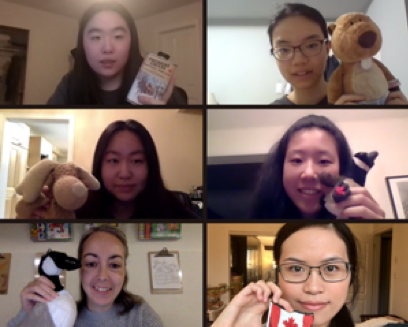Team Canada Excels at Inaugural European Girls' Olympiad in Informatics

The European Girls’ Olympiad in Informatics (EGOI) held its inaugural competition this year in Zurich, Switzerland. Created by women for women, EGOI brings young women together from around the world who have a passion for competitive programming. Led by the Centre for Education in Mathematics and Computing (CEMC), Team Canada welcomes young women and other young people of under-represented genders to participate.
The event, which challenges participants’ algorithmic problem solving and computer programming skills, brought 157 high school students from 43 different countries together for two days of competition.
Each day, participants had five hours to solve four problems. Team Canada faced an extra challenge: in order to participate safely from their homes, the Canadian team had to grapple with a time zone difference. Three of the four team members began their day at 4:00 am, and the fourth started at 1:00 am and pushed through the night.
In the face of exhaustion, Team Canada excelled. Each member of the team earned a bronze medal.
Cindy Zhu finished in 43rd place, just three spots shy of a silver medal. Zhu, who will be studying computer science at Carnegie Mellon University in the fall, saw the event as a unique opportunity for “girls all around the globe interested in programming [to] help and propel each other to become better.”
Lu Chen finished in 49th place. Chen, who is entering Grade 11 this year, reflected: “The competition offered interesting yet difficult tasks, but overcoming challenges is what makes life fun.”
“EGOI was extremely valuable. It inspired and motivated me to cross the gender gap in STEM.” |
Sophie Xuan ranked 51st and is also entering Grade 11. For Xuan, community-building was key: “The experience of meeting other girls both within Canada and across the world has really given me a distinct sense of community.”
Nicole Han, who is entering Grade 12, said that “EGOI was extremely valuable.” Han moved up the ranks an impressive 65 spots to 73rd place between the first and second day of the competition. “It inspired and motivated me to cross the gender gap in STEM,” she said.
The four young women were led by Sarah Chan from the CEMC, but the real glue holding the team together was University of Waterloo student Ava Pun. Pun, who is completing a double major in computer science and combinatorics and optimization, guided the team through weekly training sessions and coaching. As a past silver medalist in the International Olympiad in Informatics, Pun became a role model for this year’s bronze-medal winning team.
Beyond Competition
While contests and competitions give students a unique opportunity to grow their computing skills and knowledge, they’re not the right fit for everyone. That’s why the CEMC offers a number of entry points for students to explore computer science.
Our Computer Science Circles, for example, is one of a number of free, online resources for beginners to learn how to program. And events like the Programming Challenge for Girls and SPARCS—which stands for Seeing Possibilities and Rewards in Computer Science—are designed to help bridge the gender gap in computing.
Computer science educators can also turn to the CEMC to help them enrich student learning. Computer Science and Society includes activities, assignment examples, discussion questions, quizzes and more that teachers can use to help students make their learning personal.
Our Summer Conference for Computer Studies Educators is another important resource. The annual event brings computer science and computer technology teachers together to network, learn new skills and generate new ideas for the classroom.




 CEMC
CEMC